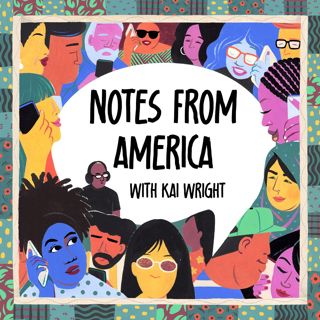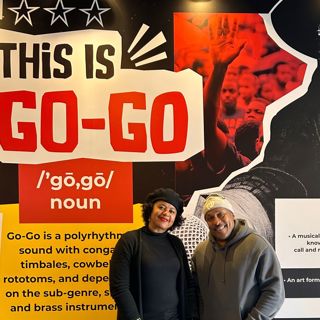
The Life and Work of Ida B. Wells
Journalist and activist Ida B. Wells was in some ways, a forgotten figure, overlooked even in black civil rights history. But her reporting on lynchings across the South was unwavering in its mission: calling America out on racial injustice. And this week, that work received a special Pulitzer Prize Citation. Also, in 2018 we recorded a live episode remembering the life and work of Ida B. Wells at The Greene Space. Watch the whole event here. Tell us what you think. We're @noteswithkai on Instagram and X (Twitter). Email us at notes@wnyc.org. Send us a voice message by recording yourself on your phone and emailing us, or record one here.Notes from America airs live on Sundays at 6 p.m. ET. The podcast episodes are lightly edited from our live broadcasts.
8 Maj 202030min

Inside the Prison Pandemic
Three months ago, Kai Wright joined The New Yorker Radio Hour's David Remnick, for a special episode about the effects of mass incarceration and the movement to end it. And now, as the coronavirus pandemic puts inmates in acute and disproportionate danger, that effort gains new traction. Wright and Remnick reconvene to examine the COVID-19 crisis in prison and its political effects. Kai Wright interviews Udi Ofer, the head of the ACLU’s justice division, who has been leading the organization’s effort to get people out of unsafe environments in jails and prisons. Ofer notes that “the communities that the C.D.C. has told us are most vulnerable to COVID-19 are exactly the communities that are housed in our nation’s jails and prisons,” including a disproportionately older population among inmates. And David Remnick speaks with Phil Murphy, the governor of New Jersey, who has signed an executive order to release certain at-risk inmates from states prisons — the sort of measure that would once have been deeply unpopular and risky. Tell us what you think. We're @noteswithkai on Instagram and X (Twitter). Email us at notes@wnyc.org. Send us a voice message by recording yourself on your phone and emailing us, or record one here.Notes from America airs live on Sundays at 6 p.m. ET. The podcast episodes are lightly edited from our live broadcasts.
1 Maj 202021min

Why Covid-19 Is Killing Black People
As black people die from Covid-19 at disproportionate rates, the disease is highlighting health disparities we’ve long known about. Kai Wright speaks with Arline Geronimus, a public health researcher, about what happens to black people’s bodies — on a cellular level — while living in a racist society. Plus, we hear from senior producer Veralyn Williams’ dad, an essential worker in New York who’s doing his best to weather the pandemic. Tell us what you think. We're @noteswithkai on Instagram and X (Twitter). Email us at notes@wnyc.org. Send us a voice message by recording yourself on your phone and emailing us, or record one here.Notes from America airs live on Sundays at 6 p.m. ET. The podcast episodes are lightly edited from our live broadcasts.
24 Apr 202033min

Questions to Ask While Waiting
Right now, many of us are sheltered in our homes — alone or with company — finding ways to connect in our “new normal.” And as we grapple with how COVID-19 has reshaped our day-to-day, all most of us can do is wait it out. So in this episode, we’re going to turn to a poem, 45 Questions to Ask While Waiting, our reporter Jenny Casas looks to when she wants to get to know the people around her. The poem was written in 2017, Chicago-based artist, educator and prison/police abolitionist, Benji Hart. The list has questions that range from the mundane (2. Where is the least-visited corner in your home?) to the romantic (5. What is the cruelest thing you have done in love?) to the deeply personal (20. What hypocrisy in yourself have you yet to amend?) — and this week, Jenny and Benji discuss how they can be used as a tool for relating with ourselves and each other. Additional resources: Hear about Benji Hart’s work in progress, World After This One. Read one of the main inspirations for 45 Questions To Ask While Waiting, Dean Spade’s piece Questionnaire. Tell us what you think. We're @noteswithkai on Instagram and X (Twitter). Email us at notes@wnyc.org. Send us a voice message by recording yourself on your phone and emailing us, or record one here.Notes from America airs live on Sundays at 6 p.m. ET. The podcast episodes are lightly edited from our live broadcasts.
13 Apr 202016min

A History of Style in a Pandemic
When health officials ordered everyone to wear face masks during the 1918 influenza pandemic, black women in Chicago got creative and crafted jewel-studded veils to stay safe. Kai Wright speaks with The Undefeated’s Soraya Nadia McDonald about seeking joy — and staying fly — in times of crisis. Show us how you’re staying safe and stylish: Get your look together and send us a selfie with the hashtag #USofAnxiety2020. Read Soraya's full article at The Undefeated. Tell us what you think. We're @noteswithkai on Instagram and X (Twitter). Email us at notes@wnyc.org. Send us a voice message by recording yourself on your phone and emailing us, or record one here.Notes from America airs live on Sundays at 6 p.m. ET. The podcast episodes are lightly edited from our live broadcasts.
8 Apr 202010min

Dispatches from People Stranded in Place
We’ve got two dispatches from communities where "social-distancing" is not an option. And where decisions we made long ago about homelessness and immigration policy are getting in the way of our ability to protect against Covid 19. WNYC Investigative Reporter Matt Katz brings us calls from inside immigration detention centers. And our reporter Marianne McCune checks in with a homeless advocate, Sam Dennison, who lives and works inside San Francisco's Tenderloin neighborhood, with the highest number of people sleeping in tents in the city. The United States of Anxiety’s health coverage is supported in part by the Robert Wood Johnson Foundation. Working to build a Culture of Health that ensures everyone in America has a fair and just opportunity for health and well-being. More at RWJF.org. Tell us what you think. We're @noteswithkai on Instagram and X (Twitter). Email us at notes@wnyc.org. Send us a voice message by recording yourself on your phone and emailing us, or record one here.Notes from America airs live on Sundays at 6 p.m. ET. The podcast episodes are lightly edited from our live broadcasts.
3 Apr 202027min

Keep Calm and Check Your Bias
Our current situation has left many of us asking fundamental questions about our work, about our relationships, and the meaning of home. This week, we're checking in on one another and taking stock. Host Kai Wright calls reporter Jenny Casas on her drive from New York to Chicago. Then, he and Dr. Gail Christopher, an expert in public health and founder of the Ntianu Center for Healing and Nature, connect for a conversation about Kai's "Katrina Feeling," how racism is poised to affect us all in the face of COVID-19, and why it's important to spend some time among the trees. The United States of Anxiety’s health coverage is supported in part by the Robert Wood Johnson Foundation. Working to build a Culture of Health that ensures everyone in America has a fair and just opportunity for health and well-being. More at RWJF.org. Tell us what you think. We're @noteswithkai on Instagram and X (Twitter). Email us at notes@wnyc.org. Send us a voice message by recording yourself on your phone and emailing us, or record one here.Notes from America airs live on Sundays at 6 p.m. ET. The podcast episodes are lightly edited from our live broadcasts.
26 Mars 202025min

Last Chance at Justice
History tells us that, in a time of crisis, we have to be careful about how we respond. At the start of the Iraq War in 2003, Salah Hasan Nusaif al-Ejaili was working as a journalist when the U.S. military detained him inside Abu Ghraib, a prison that would become notorious for American abuses committed in the wake of the September 11th terrorist attacks. Only a handful of people were ever held responsible—all of them military personnel. But the private contractors who oversaw interrogations at Abu Ghraib have yet to be held accountable. In this episode, one man's pursuit to get justice 17 years after the war began. Hosted by Kai Wright. Reported by Seth Freed Wessler, in partnership with Reveal and Type Media Center. Produced and edited by Christopher Werth. Tell us what you think. We're @noteswithkai on Instagram and X (Twitter). Email us at notes@wnyc.org. Send us a voice message by recording yourself on your phone and emailing us, or record one here.Notes from America airs live on Sundays at 6 p.m. ET. The podcast episodes are lightly edited from our live broadcasts.
19 Mars 202040min






















